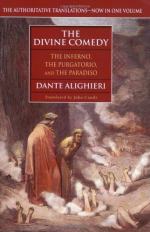|
This section contains 1,352 words (approx. 5 pages at 300 words per page) |

|
SOURCE: Eliot, T. S. “Dante.” In Selected Essays, pp. 199-237. New York: Harcourt, Brace and Company, 1950.
In this excerpt from an essay originally published in 1932, Eliot praises the Paradiso as a masterpiece by the greatest poet in the Western tradition.
The Paradiso is not monotonous. It is as various as any poem. And take the Comedy as a whole, you can compare it to nothing but the entire dramatic work of Shakespeare. The comparison of the Vita Nuova with the Sonnets is another, and interesting, occupation. Dante and Shakespeare divide the modern world between them; there is no third.
We should begin by thinking of Dante fixing his gaze on Beatrice:
Nel suo aspetto tal dentro mi fei, qual si fe' Glauco nel gustar dell' erba, che il fe' consorto in mar degli altri dei. Trasumanar significar per verba non si poria; pero l'esemplo basti a cui esperienza...
|
This section contains 1,352 words (approx. 5 pages at 300 words per page) |

|


